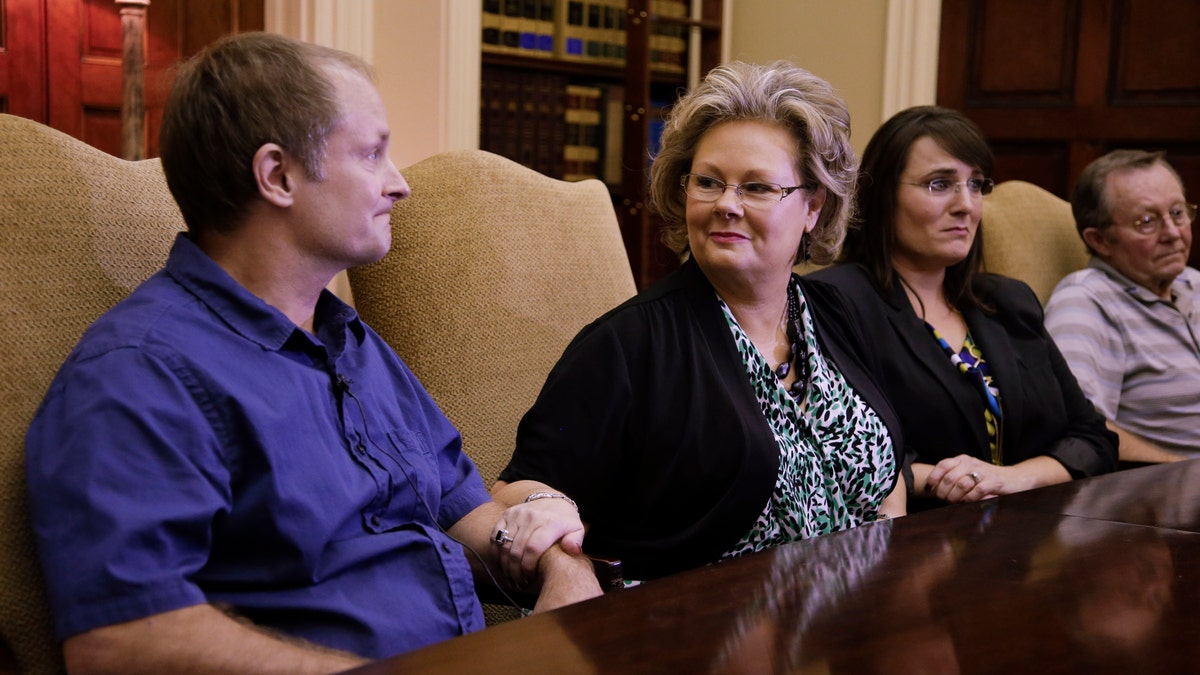
Teresa Russell, second from left, comforts her brother, Jeffrey Russell, left, as Jeffrey talks about their mother, Janet Russell, who is suffering from a deadly fungal meningitis. (AP Photo/Mark Humphrey)
A week after her annual steroid shot for back pain, Janet Russell began getting unbearable headaches. A fever followed. Doctors admitted her to the hospital, but couldn't say what was wrong.
"She is screaming and nothing is helping. They have already given her medication, but nothing is helping," said Russell's daughter, Tracy Barreiro. "It continually escalated."
Unexplained pain and confusion about its cause are troubling patients like the 71-year-old Russell, diagnosed with a deadly fungal meningitis likely contracted from a custom-made steroid shot, and medical professionals who have little experience treating the rare disease.
Russell's husband, Robert, said his wife's doctor told him early on, "`You can call it meningitis, you can call it anything you want to, but quite frankly, nobody, not anybody in this country, knows what it is at this point because we have never seen it.'"
"They didn't really tell us it was a fungal meningitis until the CDC told them," he said.
The Centers for Disease Control and Prevention said as of Friday, five people have died in the outbreak, and have reported 47 cases in seven states. Investigators have focused on a steroid custom-made by a specialty Massachusetts pharmacy, as the source.
At least 29 cases are in Tennessee, and three people there have died, including the founder of an inner-city Christian center for at-risk children in Nashville.
State health officials trying to contain the outbreak are contacting about 1,000 patients who received epidural steroid injections at three clinics between July 1 and Sept. 28.
Russell was one of them, her family said, receiving her last back pain shot Aug. 30 from the Saint Thomas Outpatient Neurology Center, which got 2,000 vials of the injectable steroid from the New England Compounding Center in Framingham, Mass.
The suburban Nashville woman is hospitalized in intensive care, can only say a few words and has trouble keeping down even water. She suffered a brain hemorrhage last week, family said.
She first started to have headaches and neck pain a week after the last injection, family said. No one thought it was related to the injections. "Never in your wildest dreams do you think it's related to that," Barreiro said.
She went to the hospital emergency room on Sept. 7, but was sent home with pain medication and a diagnosis of flu-like symptoms. Three days later, she returned to the hospital; the pain got worse.
"Her headache progressed to the point of unbearable," said Teresa Russell, another daughter. "We were all frantic at that point, to get her some kind of relief. ... Every day we were asking doctor after doctor, `What is this and what are we going to do?'"
Doctors first suspected bacterial meningitis, requiring her family to wear protective clothing when they visited her, Robert Russell said.
"It's something that we have never had to deal with and it's something that a lot of people don't know anything about, including myself," Russell said.
Saint Thomas Hospital, where Russell's family said she is being treated, declined to release information about individual patients, citing medical privacy laws. The neurology center voluntarily closed last month because of the investigation and isn't commenting.
A third fungal meningitis patient died in Tennessee on Wednesday at the same hospital, according to the facility's chief of medicine, Dr. Robert Latham. The patient was identified as Diana Reed by a family lawyer. The attorney, Bill Lassiter, wouldn't discuss when the 56-year-old woman became ill or when she received steroid injections.
Reed had helped to found the Wayne Reed Christian Child Care Center in Nashville, which works with children who are educationally and developmentally at risk, said Reed's pastor, Josh Graves. He wouldn't comment on her illness.
"She had a robust faith. She was passionate about serving those who were poor in Nashville," said Graves. "She was tough, relentless and every day pursued those things she felt God was calling her to do."







































